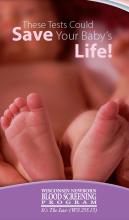Newborn Screening: Blood Screening for Newborns
Part of Wisconsin’s Newborn Screening program is a blood screening. This is a special blood test for newborns that checks for 50 disorders in the first days of life.
Since 1965, blood screening for newborns has prevented death and disability for hundreds of babies in Wisconsin.
Newborn blood screening FAQs (frequently asked questions)
Expand a question to learn more about blood screening for newborns in Wisconsin.
Newborn blood screening is important because it helps to know if your baby has a disorder that you can’t see. Most babies look healthy when they are born. Some may seem healthy but have a rare disorder that you wouldn’t know about without a blood test. It’s best to treat these disorders early to prevent serious health problems.
State law (Wis. Stat. § 253.13, Tests for Congenital Disorders) also requires all babies born in Wisconsin hospitals to have a newborn screening before they leave the hospital. Babies born at home must be tested within a week after birth—ideally within a few days.
Note: Parents or caregivers may refuse a newborn screening for their baby. This is only allowed if religious beliefs and practices or personal views do not allow this testing. If you refuse a newborn screening, you may be asked to sign a paper. The paper states that you refused to have your baby tested for these serious disorders.
In the first days of life a few drops of blood from the baby’s heel are put on a special paper. This is sent to the Wisconsin State Lab of Hygiene for testing.
The blood test is simple and safe. Some babies may cry when their heel is pricked, but the pain does not last long. There is a very low risk of infection on the heel.
The newborn blood screening is most accurate if it happens after the baby’s first 24 hours of life. If the baby’s blood screening happens before 24 hours of age, your doctor may ask to repeat the test when the baby is one to two weeks old. For babies who are born early or need special care after birth, the timing of testing may differ. Make sure your baby is tested within the first days of life.
A newborn blood screening tests newborns for 50 disorders.
View a list of Conditions Newborns are Screened for in Wisconsin.
Yes. There are two other screenings that are part of the Wisconsin Newborn Screening program:
- Hearing screening—Accurate and gentle methods are used to check the baby’s hearing before they leave the hospital. Often, hearing is screened while the baby rests.
- Critical congenital heart disease screening—A sensor (called a pulse oximeter) is placed near the foot or hand. It checks how much oxygen is in the blood.
No single test can find all disorders in newborns. There may be other rare disorders that are not included in the newborn screening. To learn more, talk to your baby’s doctor.
Your baby’s doctor will get the results of the blood screening. You should ask about the results. You have the right to ask your doctor or nurse to explain the screening process and give the results to you.
Make sure your correct address and phone number are on file at the birth hospital and with your baby’s doctor. If you don’t have a phone, leave the number of a friend or relative who can find you.
Sometimes, a newborn blood screening has abnormal results. This doesn’t mean that your baby has a disorder. The screening helps find babies who may be at risk for a disorder.
If your newborn’s screen is abnormal, your baby’s doctor will talk with you about next steps. They will likely do a re-screen. It’s important that a repeat screening test is done as soon as possible.
They may refer you to a specialist for other testing and genetic counseling. If your baby is diagnosed with a disorder, they will get treatment to prevent possible problems.
The treatment for each blood disorder is different. Some treatments involve a special diet. Others involve medicine. When treated early, many babies grow up to lead normal, healthy lives.
In a few cases, the disorder may not be fully treatable. Early diagnosis and treatment still give your baby the best chance of normal growth and development.
Newborn blood test brochures
Are you a provider? Could your community benefit from newborn blood screening materials? Download our brochure, These Tests Could Save Your Baby’s Life, P-40125. You can access the brochure in English and Spanish.
To order printed brochures, follow these steps:
- Download the Forms/Publications Order form, F-80025A.
- Fill in the correct details:
- Shipping address with a street address (no PO boxes).
- Date, phone number, and email.
- Quantity: Request what you need for three to six months.
- Publication Number: Add P-40125 (English) or P-40125S (Spanish).
- Publication Title: Write, “These Tests Could Save Your Baby’s Life.”
- Save and email the form to dhsfmorder@dhs.wisconsin.gov.

